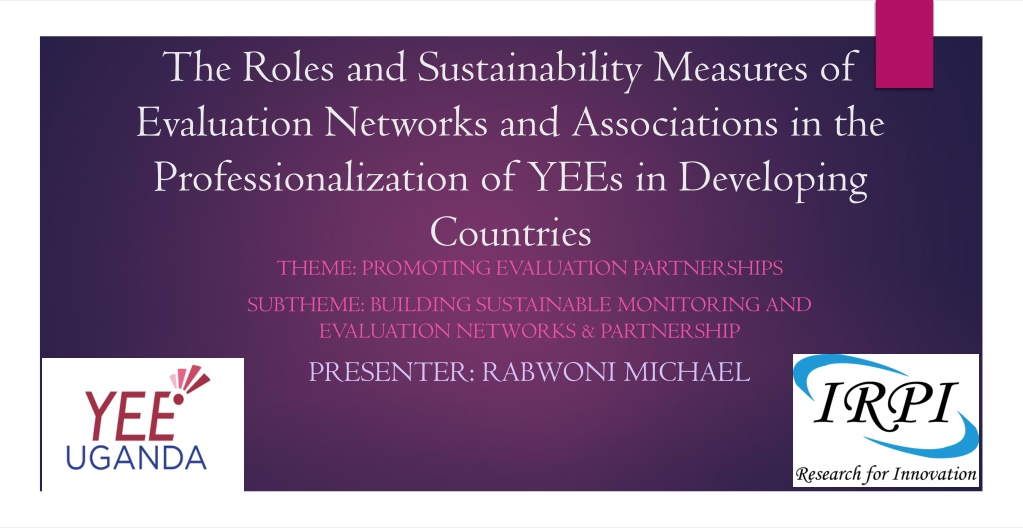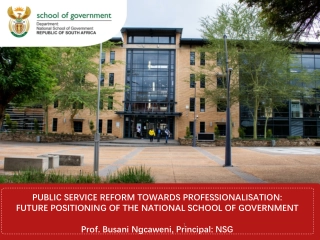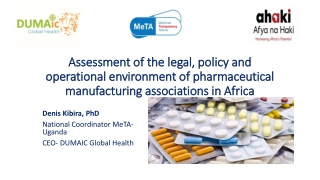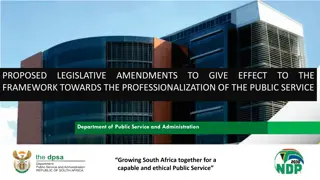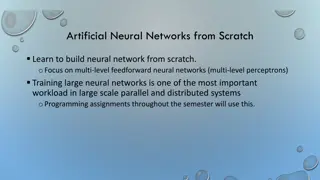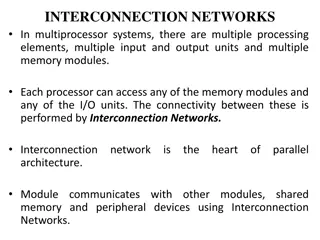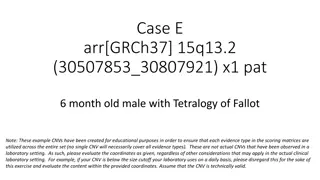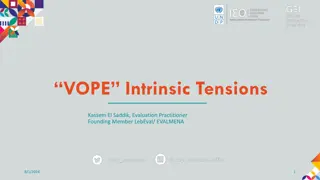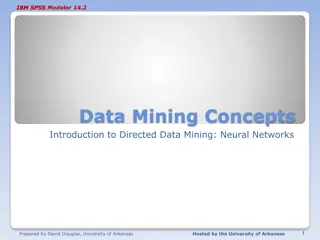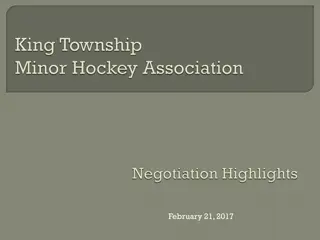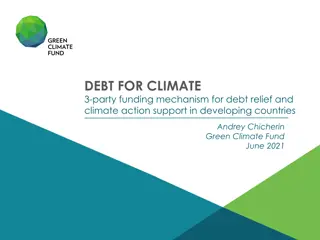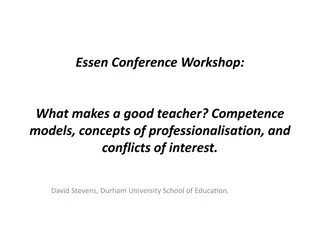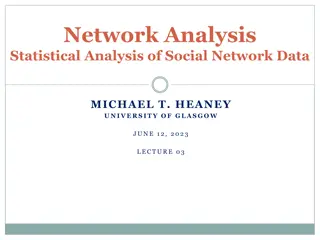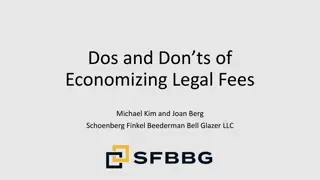Enhancing Professionalization of YEEs in Developing Countries through Evaluation Networks and Associations
This paper explores the crucial roles and sustainability measures of evaluation networks and associations in advancing the professional development of Young and Emerging Evaluators (YEEs) in developing nations. It discusses the objectives of strengthening these networks, enhancing YEE skills, and proposing sustainability measures for continuous growth. The background highlights the growth of national VOPEs and the establishment of evaluation associations globally, with a focus on the Uganda Evaluation Association's YEE program components.
Download Presentation

Please find below an Image/Link to download the presentation.
The content on the website is provided AS IS for your information and personal use only. It may not be sold, licensed, or shared on other websites without obtaining consent from the author. Download presentation by click this link. If you encounter any issues during the download, it is possible that the publisher has removed the file from their server.
E N D
Presentation Transcript
The Roles and Sustainability Measures of Evaluation Networks and Associations in the Professionalization of YEEs in Developing Countries THEME: PROMOTING EVALUATION PARTNERSHIPS SUBTHEME: BUILDING SUSTAINABLE MONITORING AND EVALUATION NETWORKS & PARTNERSHIP PRESENTER: RABWONI MICHAEL
Purpose of the Paper Purpose of the Paper The paper discussed the roles and sustainability measures of Evaluation networks and associations in the professionalization of Young and Emerging Evaluators (YEEs) in the developing countries.
Objectives The The specific To discuss the various roles that associations and networks contribute towards the professionalism of YEEs; To explain the various ways in which networks and associations can be strengthened in order to enhance theYEEs skills and lastly; to suggest the various sustainability measures for these networks and associations through which the young and emerging evaluators would grow professionally. specific objectives objectives are are:
Background Background Development of national VOPEs started in the late 1970s and early 1980s with the establishment of the Evaluation Research Society in the USA in 1978 and the Canadian Evaluation Society in 1981. Early 2000s the evaluation professionals felt the need for global integration and global platforms for professional exchange. This led to the establishment of the International Development Evaluation Association (IDEAS), an individual membership organization in 2002, and the International Organization for Cooperation in Evaluation (IOCE), a global association of regional and national VOPEs in 2003. The launch of the EvalPartners Initiative in January 2012 marked the new stage in the global integration of the VOPE community and the readiness of this community to contribute to the social change. It is in this trend that the Uganda Evaluation Association (UEA) was created in 2001 as a national chapter of African Evaluation Association (AfrEA) whose numbers have continuously grown from 50 members to over 500 as of June 2018.
Background cont. Background cont. It s in this environment that the Young and Emerging Evaluators Program is created in Uganda, 2017. This is a program under the UEA. In the Ugandan context, the YEE program implementation plan has at least five components which include: Engagement of the UEA leadership and members Engagement of the Evaluation Stakeholders The Mentorship and Internship program (MIP) The Young and Emerging Evaluators Network (YEEN) YEE Communication for Development (Media)
YEEs Uganda YEEs Uganda- -Brief overview Brief overview YEEs Vision is Increasing Evaluation Capacities in Uganda Mission: To contribute to sustainable and equitable development that depends on the production of high- quality evaluations that meet standards for quality dimensions Goal: To promote YEEs to become competent, experienced and well-networked professionals who contribute to evaluation capacity at national, regional and also international levels through the inclusion of YEEs in evaluations conducted (internships), trainings and mentorships. Three strategic objectives will guide the activities of the programme. Develop UEA institutional capacity Professionalization of Evaluators Professionalization of Evaluators Form and strengthen Young & Emerging Evaluators Network
Roles of Associations and Networks in the Contribution of YEEs Roles of Associations and Networks in the Contribution of YEEs Professionalism in Developing Countries Professionalism in Developing Countries Professional evaluation associations play a crucial role in defining and regulating the nature of practice, validation, qualification and certification, acting as a gateway to the profession. Associations and networks usually conduct events such as: conferences, workshops and seminars, and publications that provide a platform for professional exposure and dialogue. VOPEs contribute to the development of national evaluation capacities by building capacities of individual evaluators. Professional Associations and networks are a hub in which knowledge about a person s choice of industry can be obtained.
Roles Cont. Roles Cont. Membership of YEEs in associations also portrays the seriousness that an enrolled individual has, and the determination that they have towards advancing in their career. standardising and making known to the profession and to the general public the ethical principles that guide the work of evaluators and other professionals providing information services. a basis and backup for both practicing professionals and YEEs. (allow members to reach a common goal whether for legislative, educational, social and/or economic reasons) evaluation associations and networks in developing countries prioritize their membership through advocacy, capacity building, framing competency standards, and establishing Codes of Ethics, and so on. A major role of professional associations and networks in general is essentially to police practice
Summary of Roles Summary of Roles Engender and sustain ethical practice, building codes of behaviour and professional standards informed by agreed ethical standards; Inform employers, government, trainers, associated and related fields, clients and the public in general about professional expectations and models of service delivery; Uphold and expand recognition and status of the profession; Generate and support relevant professional research; Provide multidimensional forums/platforms/support networks to share and facilitate the preservation and advancement of best practice; Frame, influence, advance and inform members about policy, technical and theoretical innovation; Provide practicing professionals, students of professional practice and those in training with relatively easy access to a database which they can join and make their profession and personal contact details available to other people and potential clients/users/funders and employers; Offer career information, other learning opportunities; Offer in- service training and introductory courses/promotional material for people wanting to begin a career in youth work; Provide a validating service for other training/education providers and advice to organisations, regional and national government
Various ways to Strengthen Associations and Networks in Various ways to Strengthen Associations and Networks in order to enhance YEEs Skills order to enhance YEEs Skills Launching an association or a professional network whether on a regional or national level comes with an excitement ,however, much care is required to maintain these associations and in a way, to create an environment in which they can grow. For YEEs to have enhanced skills through these associations, there must be minimum or no hindrances whatsoever that may restrict them. A concern about professionalization of the Evaluation profession is a danger of this creating barriers to entry, but not of the economic kind: it is the barriers to innovation, creativity, caring and intellectual openness (Ian, 2018) .
Ways Cont. Ways Cont. The real challenge is to avoid professionalised rigidity and the risk that evaluation be demoted to a set of accountability, control and knowledge management techniques, a risk that is particularly present in the dynamics of donor funded development (Ian, 2018). For YEEs to benefit from these associations and networks, it is necessary that whatever forms professionalization initiatives take, to make sure that this direction opens, rather than closes, doors to evaluation colleagues globally and locally especially theYEEs. Evaluators from developing countries are sometimes faced with a phenomenon where there is no conducive environment to exercise their profession or maybe, where only elements of it do exist, leading them to struggle with the lack of support and legitimacy in their practice. An evaluation of a development project or program can easily be seen as an attack on persons or institutions, and in the absence of evaluation champions or advocates, it is difficult to sustain evaluation practice. One realises that the process of evaluation is tainted with suspicion head-on. (Question: are you evaluating to criticise or are you evaluating to help or show progress)
Ways Cont. Ways Cont. Alignment of the mother VOPE s goals and Vision with that of the YEE association is yet another way to strengthen associations under whichYEEs can grow and develop.
Suggested Suggested Sustainability Sustainability Measures Measures for for Associations Associations and and Networks Networks The continuity of associations and networks after their establishment is so critical in a developing country. The sustainability measures of these associations and networks if YEEs in developing countries are to benefit from them include: Sustainable SustainableTraining professional development training programs or peer-peer training programs) Training Programs Programs
Sustainability Measures Cont. Sustainability Measures Cont. Professional Professional Development As a term: a formal process such as a conference, seminar, or workshop; collaborative learning among members of a work team; or a course at a college or university. However, professional development can also occur in informal contexts such as discussions among work colleagues, independent reading and research, observations of a colleague s work, or other learning from a peer Development
Sustainability Measures Cont. Sustainability Measures Cont. Peer to Peer Capacity Building Peer to Peer Capacity Building There is need for a collaboration between the neighbouring countries associations in ways that can enable them grow together. Several programs could be carried out such as peer to peer learning programs between associations. It essential that YEEs be part of such programs so that they can themselves pave and create their own spaces in that line. In Uganda, a Peer to Peer Learning programme Uganda was conducted with the Tanzania Regional integration of Capacities in Evaluation (RICE) for SDGs sponsored by international Organisation for Cooperation in Evaluation (IOCE) in 2017. Another Peer-peer capacity building program was the Uganda Burundi Peer to Peer Mentoring Project sponsored by AFREA in November 2016 whose program Team was led by the UEA President and AfrEA Executive Director
Sustainability Measures Cont. Sustainability Measures Cont. Prioritise the Financial Capacity of YEEs Prioritise the Financial Capacity of YEEs If an evaluator is to attend a conference in a different location other than their own (even their own), they would have to incur several costs which include: registration, transportation, lodging, and meals. There are also membership fees in addition to that. (UEA s fees structure is flexible to consider YEEs)
Sustainability Measures Cont. Sustainability Measures Cont. Creation Creation of of University University Charters Charters Lastly, YEEs have to be captured right from the start and efforts made to build in them an interest to be part of the professional evaluation associations and networks of the country that they are. This can be done through the creation of University Charters such as those that have been established in Uganda in universities such as; Uganda Martyrs University and Mbale University. just as the Mother VOPE would be in direct supervision and initiation of the YEEs, the YEEs in turn need to be empowered and charged with University Charters. This would not only give them confidence but it would also give them an environment in which they would be creative towards the acquisition of the skills needed in evaluation in general
Conclusion Conclusion Evaluation Associations and Networks in developing countries are an essential platform through which YEEs can develop in the Evaluation profession, directly and indirectly. In these they are exposed to training and development programs at both local and international level. In these platforms they are exposed to different opportunities that directly link with the practice, maybe people who will give them an opportunity to work, potential employers and so on. Evaluation Associations and networks with a strong inclination to the YEEs or that are established by YEEs need to be aligned with the mother VOPEs at all strategic levels if they are to be sustained. Lastly, Evaluation University Charters should be established to attract more YEEs so as to bring on board more members to the profession, peer-to peer training programs are essential in neighbouring associations staying in touch and helping each other grow.
